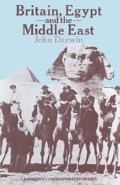Abstract
Up until the moment when his discussions in London with the pashas Adly and Zaghlul were broken off in the middle of August 1920, Milner had not revealed to his Cabinet colleagues either the objectives or the procedure of his enquiry into the Anglo-Egyptian relationship. And although he had indicated to the Foreign Secretary, as the responsible minister, the main lines of the Mission’s approach, and had relayed through him terse reports of the London negotiations to Allenby, even Curzon had not been consulted about the extent to which the original project for a treaty of alliance should be modified in order to obtain the consent of Adly and Zaghlul. The reasons for Milner’s reluctance to canvass the opinion of his colleagues before reaching his provisional agreement with Zaghlul are not difficult to understand. The Mission’s proceedings in Egypt had been inconclusive, even disastrous. They could provide few arguments for the changes which Milner wished to bring about in British policy. Indeed his failure to draw the ‘moderates’ out into the open seemed, at this stage, powerful evidence that the solution which he propounded was neither safe nor feasible. There was, therefore, every reason for Milner to postpone his report to the Cabinet until such time as he could present an alternative policy with some claims to viability, and with some expectation that it would not only command support in Egypt, but also ease the difficulties under which the imperial presence was labouring.
Access this chapter
Tax calculation will be finalised at checkout
Purchases are for personal use only
Preview
Unable to display preview. Download preview PDF.
Notes
In April 1918. See A.M. Gollin, Proconsulin Politics (London, 1964) p. 512.
Earl of Ronaldshay, The Life of Lord Curzon, vol. III (London, 1929) pp. 251–3.
Thomas Jones, Whitehall Diary, vol. III, ed. K. Middlemas (London, 1971) p. 85.
See W. G. Hayter, Recent Constitutional Developments in Egypt (Cambridge, 1924).
Lord Lloyd, Egypt Since Cromer, vol. I (London, 1933) p. 342.
Copyright information
© 1981 John Darwin
About this chapter
Cite this chapter
Darwin, J. (1981). Egypt and the Cabinet. In: Britain, Egypt and the Middle East. Cambridge Commonwealth Series. Palgrave Macmillan, London. https://doi.org/10.1007/978-1-349-16529-2_5
Download citation
DOI: https://doi.org/10.1007/978-1-349-16529-2_5
Publisher Name: Palgrave Macmillan, London
Print ISBN: 978-1-349-16531-5
Online ISBN: 978-1-349-16529-2
eBook Packages: Palgrave History CollectionHistory (R0)

